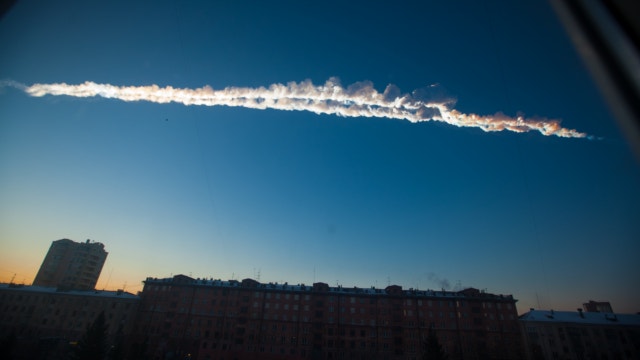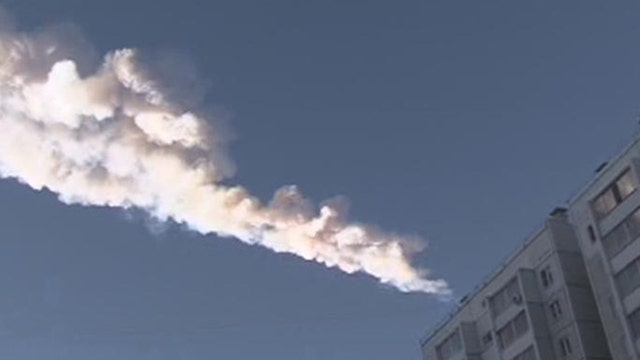Hundreds reportedly injured by blasts as meteor falls in Russia Published February 15, 2013
Associated Press
-
 Feb. 15, 2013: In this frame grab made from a video done with a dashboard camera, on a highway from Kostanai, Kazakhstan, to Chelyabinsk region, Russia, provided by Nasha Gazeta newspaper, a meteorite contrail is seen.AP2013
Feb. 15, 2013: In this frame grab made from a video done with a dashboard camera, on a highway from Kostanai, Kazakhstan, to Chelyabinsk region, Russia, provided by Nasha Gazeta newspaper, a meteorite contrail is seen.AP2013 -
 Feb. 15, 2013.: A meteorite contrail is seen over Chelyabinsk.AP
Feb. 15, 2013.: A meteorite contrail is seen over Chelyabinsk.AP -
 February 15, 2013: The trail of a falling object is seen above a residential apartment block in the Urals city of Chelyabinsk, in this still image taken from video shot.REUTERS
February 15, 2013: The trail of a falling object is seen above a residential apartment block in the Urals city of Chelyabinsk, in this still image taken from video shot.REUTERS
Next Slide Previous Slide A meteor streaked across the sky above Russia's Ural Mountains on Friday morning, causing sharp explosions and injuring more than 500 people, many of them hurt by broken glass.
"There was panic. People had no idea what was happening. Everyone was going around to people's houses to check if they were OK," said Sergey Hametov, a resident of Chelyabinsk, about 930 miles east of Moscow, the biggest city in the affected region.
"We saw a big burst of light then went outside to see what it was and we heard a really loud thundering sound," he told The Associated Press by telephone.
Another Chelyabinsk resident, Valya Kazakov, said some elderly women in his neighborhood started crying out that the world was ending.
Some meteorites -- fragments of the meteor -- fell in a reservoir outside the town of Cherbakul, the regional governor's office said, according to the ITAR-Tass news agency. It was not immediately clear if any people were struck by fragments.
Meteors typically cause sizeable sonic booms when they enter the atmosphere because they are traveling much faster than the speed of sound. Injuries on the scale reported Friday, however, are extraordinarily rare.
The Emergency Ministry said more than 500 people sought treatment after the blasts and that 34 of them were hospitalized. Many of the injuries were from glass broken by the explosions.
Kolesnikov also said about 6000 square feet of a roof at a zinc factory had collapsed. There was no immediate clarification of whether the collapse was caused by meteorites or by a shock wave from one of the explosions.
Reports conflicted on what exactly happened in the clear skies. A spokeswoman for the Emergency Ministry, Irina Rossius, told The Associated Press that there was a meteor shower, but another ministry spokeswoman, Elena Smirnikh, was quoted by the Interfax news agency as saying it was a single meteor.
Amateur video broadcast on Russian television showed an object speeding across the sky about 9:20 a.m. local time, leaving a thick white contrail and an intense flash.
Russian news reports noted that the meteor hit less than a day before the asteroid 2012 DA14 is to make the closest recorded pass of an asteroid -- about 17,150 miles.
But the European Space Agency, in a post on its Twitter account, said its experts had determined there was no connection.
Small pieces of space debris -- usually parts of comets or asteroids -- that are on a collision course with the Earth are called meteoroids. When meteoroids enter the Earth's atmosphere they are called meteors. Most meteors burn up in the atmosphere, but if they survive the frictional heating and strike the surface of the Earth they are called meteorites.
The dramatic events prompted an array of reactions from prominent Russian political figures. Prime Minister Dmitry Medvedev, speaking at an economic forum in the Siberian city of Krasnoyarsk, said the meteor could be a symbol for the forum, showing that "not only the economy is vulnerable, but the whole planet."
Vladimir Zhirinovsky, the nationalist leader noted for vehement statements, said "It's not meteors falling, it's the test of a new weapon by the Americans," the RIA Novosti news agency reported.
Read more:
http://www.foxnews.com/science/2013/02/15/injuries-reported-after-meteorite-falls-in-russia-ural-mountains/#ixzz2KyOZYwoE